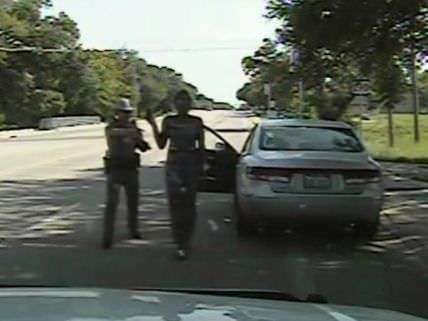Sandra Bland's Arrest and the Expectation of Meek Subservience
Trooper Brian Encinia's actions may have been legal, but that does not make them right.

Some of the reaction to my post about Sandra Bland's arrest leads me to believe I was not sufficiently explicit in criticizing Texas Trooper Brian Encinia's actions. It seems to me he had no legitimate reason to order Bland out of her car after stopping her for a minor traffic violation (changing lanes without signaling), let alone to arrest her for failing to obey that unjustified command. Judging from the dashcam video of the traffic stop, his actions were motivated by anger at Bland's insufficiently submissive attitude—in particular, her insistence that she had a right to smoke a cigarette in her own car, even if he preferred that she put it out. The escalation that ensued—which was driven, as I said, by Encinia's need "to assert his authority for its own sake"—was completely unnecessary and unprofessional.
But that does not necessarily mean it was illegal. The Supreme Court has said police do not need any special reason to order drivers out of their cars during routine traffic stops. The rationale for that rule, which reflects the Court's overly solicitious attitude toward police, is officer safety, but it does not require a case-specific inquiry as to whether a particular officer during a particular stop actually faced a potential threat that justified his order. So even if Encinia had no reasonable safety concerns regarding Bland, it looks like his order was constitutional, according to the Supreme Court's interpretation of the Fourth Amendment.
As for whether a Texas cop can legally order any driver he stops out of his car, then arrest him for failing to obey a lawful command, I'm not sure. In a 2007 discussion thread, members of the Texas District & County Attorneys Association disagreed on the right answer to that question. But the provision requiring obedience to lawful police orders is part of the transportation code, and in Texas you can be arrested even for minor traffic offenses (with the notable exception of speeding), a practice the Supreme Court has approved. If it's legal to arrest someone for failing to buckle her seat belt, why wouldn't it be legal to arrest someone for failing to comply with a cop's stupid (but apparently lawful) order? Notably, the Texas Department of Public Safety said Encinia "violated the department's procedures regarding traffic stops and the department's courtesy policy," but so far has not said he violated the law.
None of this means Encinia acted appropriately. There is a troubling gap between what's lawful and what's appropriate when it comes to police actions that would be instantly recognized as assault and kidnapping without the law's blessing. Thanks to the Supreme Court, anyone who drives a car is alarmingly vulnerable to police harassment, given the myriad offenses (both real and invented) that can lead to a traffic stop. Assuming the stop itself is legitimate, police have license to examine the vehicle with a drug-sniffing dog and, by claiming the animal alerted, search the car. They can arrest and strip-search people for trivial offenses. They can take people's money by claiming it is tied to crime, without presenting any evidence to that effect. It seems they can even order a driver out of her car for no good reason and arrest her for failing to obey.
Given the practical power that police have to mess with us and the wide discretion they have in exercising it, an attitude of meek subservience may seem advisable. That expectation is not fair, reasonable, or compatible with the principles of a free society. But it is demonstrably safer than the approach that Bland took, which was based on the assumption that she was a citizen whose constitutional rights should not be blithely violated by an authoritarian bully with a badge and a gun. I do not by any means fault Bland for questioning Encinia's authority to order her around for reasons unrelated to her traffic offense, any more than I fault Jessica Cooke for questioning the Border Patrol's authority to detain her at an internal immigration checkpoint in upstate New York. To the contrary, both young women showed exceptional bravery in standing on their rights. But as the outcomes in those cases (an arrest and a Tasing, respectively) show, such resistance to arbitrary power is brave because it is dangerous.


Show Comments (121)